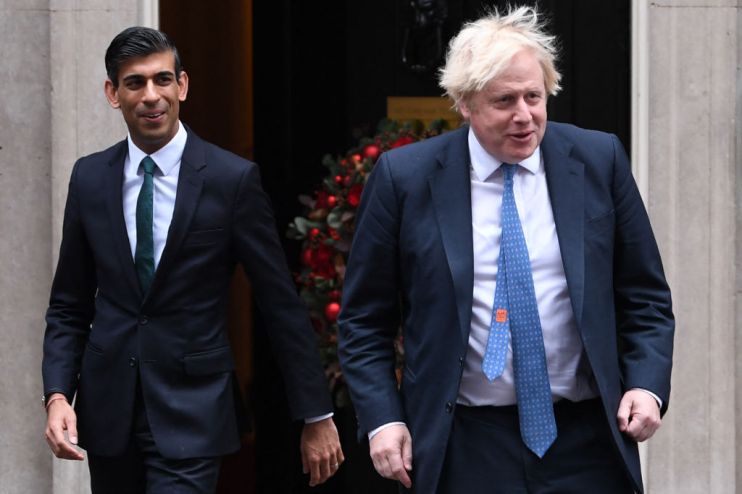Rishi Sunak’s proximity to Johnson shot him to stardom but it could be his undoing

Theresa May had a light smile on her lips as she expressed gratitude for the aviation industry and pressed the Prime Minister on his plans to drop testing rules for international travel.
The one time Prime Minister was not the only Tory MP grateful for the joy of flight: Liz Truss, the Foreign Secretary, and frontrunner in the event of a leadership bid, jetted off to Australia as Johnson was lampooned from both sides of the Commons benches yesterday.
Meanwhile Rishi Sunak, the other top contender, was forced to smile weakly from over the Prime Minister’s shoulder as MP for Bury South Christian Wakeford deserted the Conservative benches and found safe haven with Labour and David Davis, Tory grandee, told Johnson it was time to go.
In short, it was a bloodbath for the Prime Minister. Sunak, who has been lukewarm in his support for his Downing Street neighbour, was forced once more to appear at the deck of a potentially sinking ship.
Truss’ world-length distance and Sunak’s proximity sums up neatly the conundrum facing the two of them.
The Foreign Secretary will come away from the pandemic largely unscathed while Sunak, for better or worse, will have to live with his reputation as Boris Johnson’s magic money tree during Covid-19. In other words, his trajectory to stardom over the last two years has been intrinsically tied to the Prime Minister. With the country disgusted at having been taken for fools, this closeness to Boris’ boofy blonde hair may prove too much, too soon.
Sunak also faces the difficult task of trying to convince the Conservative party who hold his fate in their hands that he is as he says: a low-tax Tory convinced of spurring on growth by paring back the financial burden on businesses and individuals.
The end of Plan B restrictions hopefully marks another milestone in the pandemic, but it also provides an inflection point to look back at Sunak’s transformation from boy Chancellor to social media sensation.
He was thrown into No11 as the more pliable alternative to Sajid Javid, who, when faced with a power-grab next door, quit dramatically. Before his first month was out, he had doled out almost £40bn.
At the time, there was disquiet about his youth and ability to stand at the helm of the Exchequer. As he plots a post-Boris future, these same accusations will lurk in the hallways of Parliament and the many incendiary Whatsapp groups of Tory MPs.
Just before the last budget, Sunak followed the many whims of Boris and hiked National Insurance, a tax rise which will begin to bite in April. At the same time, energy prices will jump if the consumer price cap is hiked by 50 per cent. If a leadership election dragged on into mid-March, a Sunak win would mean installing the man tied to these decisions only weeks before the pockets of many Britons became significantly light.
For many Conservatives keen to look to a post-pandemic future, the prospect of voting for a Chancellor who has presided over a period of economic doom and an impending cost of living crisis will give pause for thought.
In comparison Truss, who has been running an almost gaudy bid for the leadership for months, was in charge of signing the trade deals that will create a map for Britain into the future. While her fangirl obsession with Margaret Thatcher may be a transparent attempt to win over the furious backbenchers of the Conservative party, neglected in Johnson’s bid to shape an amorphous and expensive levelling up agenda, it is, at least, a brand of politics they know.
